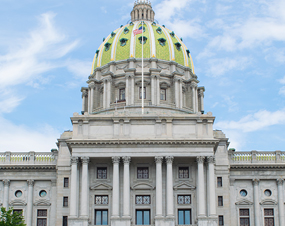 The Pennsylvania Senate last week advanced a $47.6 billion budget plan and a separate transit funding bill, setting up a direct clash with the Democratic-controlled House and leaving the state’s budget stalemate unresolved.
The Pennsylvania Senate last week advanced a $47.6 billion budget plan and a separate transit funding bill, setting up a direct clash with the Democratic-controlled House and leaving the state’s budget stalemate unresolved.
The Republican-led upper chamber returned from a six-week recess Tuesday to pass both measures along party lines. The budget bill, Senate Bill 160, holds overall spending flat from last year and is about $3 billion less than a proposal passed by the House in July. GOP leaders said their plan would get money moving to schools, hospitals and human services without raising taxes or tapping into reserves.
“This budget is grounded in reality, and the reality is that we cannot spend money that we do not have,” said Sen. Kristin Philips-Hill (R-York).
Democrats countered that funding in the proposal for K-12 education is not sufficient and the budget shortchanges other priorities such as human services and public transit. Senate Democratic Leader Jay Costa (D-Allegheny) called the measure “an exercise in futility” and urged negotiators to return to the table to find a compromise between the House and Senate plans.
Gov. Josh Shapiro’s February proposal called for $51.5 billion in spending. The House-approved version in July included significant new funding for schools and transit.
Transit Funding Dispute
The Senate also passed an amended version of House Bill 257 last Tuesday, which would provide short-term funding for public transit systems — including the Southeastern Pennsylvania Transportation Authority (SEPTA) and Pittsburgh Regional Transit (PRT) by utilizing a combination of online gaming tax revenue and existing capital funding from the Public Transportation Trust Fund (PTTF).
The proposal would deliver $292.5 million to mass transit this year and another $300 million in Fiscal Year 2026-27, as well as the same amount of funding for roads and bridges.
Republicans said the move addresses immediate operational needs without new taxes, while also directing funds to road and bridge projects statewide and allowing more time to address the state’s looming structural deficit and identify more sustainable long-term funding proposals for transportation needs.
The proposal would also require periodic fare increases beginning in 2026, annual performance evaluations of transit systems, and creates several new and enhanced safety and security measures. The legislation also allows metropolitan transit authorities to engage in public-private partnership projects to improve infrastructure and services. Democrats criticized the bill for diverting money from long-term transit infrastructure projects and not providing long-term relief.
The House previously passed Shapiro’s proposal to boost transit funding by increasing the share of state sales tax revenue earmarked for transit — a plan Republicans rejected as fiscally irresponsible.
The House Rules Committee convened last Wednesday to consider House Bill 257 with the Senate’s amendments and hear from PennDOT Secretary Mike Carroll and SEPTA General Manager Scott Sauer. Sauer said the plan “might plug the hole” in operating budgets but would create “new problems” for already underfunded capital needs and that SEPTA would plan to move forward with planned service cuts if the Senate Republicans proposal were to be adopted.
The bill was voted down by a party-line vote of 18-15. SEPTA has warned of a 20 percent service reduction starting August 24.
No Immediate Resolution
House Democratic leaders quickly dismissed the Senate’s actions, saying in a joint statement that the proposals “fail to fulfill our constitutional obligation to adequately and equitably fund our public schools” and “fail to support critical programs and services such as mass transit.” Shapiro’s office also criticized the transit bill as “not a serious, long-term proposal that can pass both chambers.”
Now, both transportation funding proposals and the 2025-2026 state budget face an uncertain path forward in the House, which is not scheduled to reconvene until September 22. The impasse comes more than six weeks after the June 30 budget deadline. Without an enacted budget, state payments to school districts and other entities will soon be delayed.
Lawmakers will now presumably resume negotiations to find a compromise that bridges sharp differences on spending levels, education, transit funding and other budget and policy priorities.